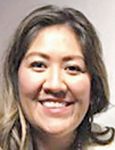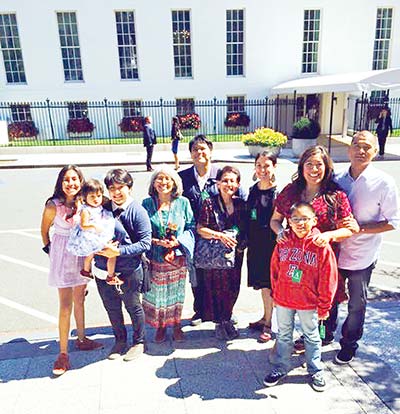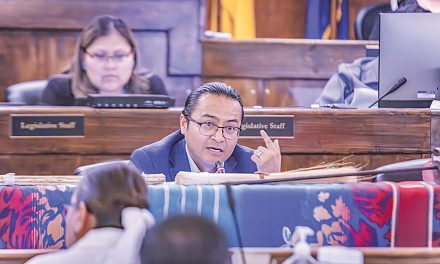
Diné one of 11 honored as White House ‘Champion of Change’
By Nick Wicksman
Special to the Times
PHOENIX

Amanda Tachine
A Navajo woman was honored at the White House earlier this week for her part as a “Champion of Change” in southern Arizona communities.
Dr. Amanda Tachine is from Ganado, Ariz. and was one of just 11 young women from across the country honored at the White House event aimed at inspiring “girls and young women to recognize their potential for leadership,” according to a White House press release.
“It was a wonderful experience,” Tachine said of Tuesday’s ceremony. “I’m actually still on Could Nine.”
Tachine was recognized for her work with Native SOAR – students outreach, access and resiliency – a two-tiered program that allows Native American graduate students to mentor Native American college students, and those college students to mentor Native American high school students.
“We were able to speak about our experience and the programs, and we were able to be a voice for the voiceless,” she said.
Native SOAR, Tachine said, came about three years ago as a branch of the larger Project SOAR, a program that mentors at-risk youth and families, which was started by Dr. Jenny Lee, one of Tachine’s advisors while she studied at the University of Arizona.
“Through my interest and being Navajo myself, I was always advocating for Native issues as a student,” Tachine said in an interview Friday morning, “Dr. Lee prompted me to think about doing something like Project SOAR but specifically for Native students.”

Amanda Tachine, second from right, poses with her husband (far right) and the rest of her family outside the White House after being honored as a “Champion of Change.”
The first tier in the Native SOAR program allows for Native American graduate students, professionals and alumni to mentor undergraduate Native American students in the hopes of “bringing the graduation rate of Native American students on par with the rate of the university,” Tachine said – noting that right now Native American students often have a lower graduation rate than the average.
The second tier in the program focuses on Native high school youth, using the college students being mentored in the first tier as mentors in the second tier.
The second tier helps focus on not just the students, Tachine said, but also on the families and the role they play in helping their children succeed in college.
The program was awarded a three-year educational grant and is currently in the final year of that grant.
After getting her doctorate in higher education from the University of Arizona, Tachine is now a postdoctoral scholar for the Center for Indian Education at Arizona State University, where she hopes she can continue to advocate for Native youth and education.
While Tachine is elated to have been honored at the White House, she said her interaction with national officials and dignitaries helped motivate her for the future.
“We have a responsibility to keep doing the work that we’re doing,” she said.
While she said she is still trying to process the extent of her experience at the ceremony, Tachine has hopes that her honoring on a national level can help bring awareness to the problems that Native youth face in the education system.
“Often Native issues, especially in regards to education, are invisible in the conversation at large,” she said.
She said she hopes this gives Native SOAR the ability to expand to help sort out Native issues as a whole.
In an educational system such as Arizona’s where university budgets are being cut, Tachine said she is worried that her program might not receive funding to sustain itself after the final year of the current grant ends, but she is hopeful that the ceremony could help with that.
“Arizona isn’t keen on assisting education budgets,” she said adding that she is “hoping that through this visibility someone will be able to help us sustain our educational efforts.”
Tachine said that once she finishes her postdoctoral studies, she hopes to remain an educator and advocate for Native youth.
To read the full article, pick up your copy of the Navajo Times at your nearest newsstand Thursday mornings!
Are you a digital subscriber? Read the most recent three weeks of stories by logging in to your online account.








 Highway 264,
Highway 264, I-40, WB @ Winslow
I-40, WB @ Winslow